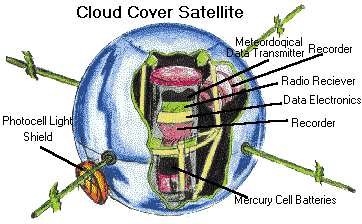Scientific Satellites
Jennifer M. / Physics 337 / April 17, 1997

Their are various kinds of scientific satellites. Among these are scientific
research, land and sea observation, weather and navigation satellites.
All of these are of significant importance throughout the United States
and the rest of the world.
Research Satellites
Certain satellites are important for scientific research. These satellites
gather data for scientific analysis. This includes observations of the
atmosphere of our planet, the stars, the sun and other parts of space.
Demeis states that earth orbiting satellites can observe celestial objects
without the interference from the Earth's atmosphere (72). These satellites
are able to record data without the interference of gases, lights, and
magnetic fields produced on earth. Scientific satellites are not restricted
to earth orbits, they also orbit the sun, moon, and other planets.
Observation Satellites
Observation satellites help to observe many features of the earth's
surface. Oberright states, "Scientists use earth observation satellites
to locate mineral deposits, to determine the location and size of freshwater
supplies . . . and to detect the spread of disease in crops and forests"(150b).
The U.S. satellites of the LANDSAT and SEASAT series find such data. The
LANDSAT satellites have been used "for making estimates of global
wheat production, for forest and range land inventories, for mineral and
oil exploration and geological mapping, and for environmental monitoring
and impact assessments"(Charyk 87). SEASAT has "detected ocean
currents, tides, and storm surges"(Charyk 87). It's instrumentation
"included a radar that measured altitude to an accuracy of 10cm (4in)
and wave heights from 1 to 20m (3 to 65 ft)"(Charyk 87). The earliest
of these types of satellites were used for cartography, or the surveying
and mapping of the Earth's surface.
Weather Satellites
Weather satellites are one of the most important instrumentation used
to predict the weather. The photos of these satellites "locate weather
features--storm systems, fronts, upper-level wind direction and speeds--that
are characterized by certain cloud formations"(Charyk 87). Island
and coastal weather stations use this data to find and track major storms.
Satellite data can "provide information about ocean, desert, and polar
areas where conventional weather reports are unavailable or limited"(Charyk
87). Meteorologists, weather forecasters, have received enormous benefits
from satellites. As early as 1960, NASA launched Trios 1 the word stands
for Television and Infrared Observation Satellite. One of the first benefits
to come from this system was the classification of clouds according to
brightness, formation, color, height, shape, and size. This greatly helped
meteorologists in the prediction of hurricane and tornadoes with earlier
and greater accuracy.
Navigation Satellites
Navigation satellites allow the operators of land vehicles, ships,
and aircraft to determine their locations within 100 feet any where on
earth. These vehicles all have on board a computerized receiver which can
pick up radio signals from satellites miles in space. This enables the
computers to pinpoint the vehicle's location. Demeis states, "By knowing
the position of several satellites from their signals, it is possible to
determine the exact location of a ship on earth. A modern system that uses
laser-beam signals can determine positions to within less than one inch"(72).
Conclusion
Scientific satellites are a necessity of life on earth today. They
show us what other planets look like, where to find minerals and water,
and they locate forest fires, ocean currents, and storms. Satellites are
used for surveying land, and predicting weather. Without satellites, jet
air travel would be a dangerous sport, and ships at sea would not be able
to navigate so easily.
References
Charyk, Joseph V. and Sidney Metzger. "Satellite, Artificial".
Academic American Encyclopedia 1992 Ed.
Demeis, Richard. "Satellite". Comptons Encyclopedia.
1995.
Oberright, John E. "Satellite, Artificial". The World
Book Encyclopedia. 1995 Ed.